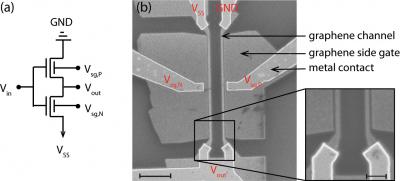A research team led by Hong-Yan Chen, a doctoral student of Purdue University, has developed graphene inverters that operate at room temperature, which realizes the production of graphene-based digital transistors.
Other scientists have developed graphene inverters but they can operate only at 77° K. The new class of graphene inverters has a gain factor above one, which is an essential condition for digital electronics that allows transistors to exhibit switching control between 0 and 1 and to amplify signals.
 Researchers Develop Graphene Inverters Operating at Room Temperature. Credit: Hong-Yan Chen, Purdue University Birck Nanotechnology Center
Researchers Develop Graphene Inverters Operating at Room Temperature. Credit: Hong-Yan Chen, Purdue University Birck Nanotechnology Center
Graphene’s utilization in consumer electronics, computers and other digital applications was limited by its zero-band gap characteristic, which is required to switch off and on, an important feature for digital transistors. The researchers have presented their findings in a paper titled ‘Complementary-Type Graphene Inverters Operating at Room-Temperature’ at the 2011 Device Research Conference in Santa Barbara, California.
To produce electronic instruments, impurities are added to silicon to modify its semiconducting properties. However, graphene cannot be doped easily like silicon. To resolve this issue, the scientists have developed electrostatic doping that allows graphene inverters to reproduce the properties of silicon inverters.
Electrostatic doping is done via an electric field that exists between metal gates that are situated at a distance of 40 nm from graphene channels. The doping can be changed by altering the voltage, allowing the researchers to try specific doping levels.
Until now, graphene transistors have been used for specific applications, including amplifiers for military systems and cell phones, but the newly developed graphene inverters allow the production of graphene transistors for broader digital applications. More work will be required to incorporate the prototype into an functional graphene circuit for digital applications.